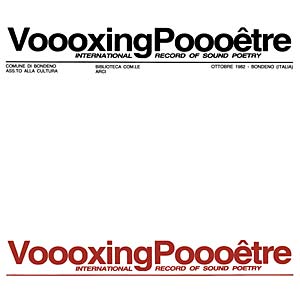V/A - Voooxing Poooêtre
Couldn't load pickup availability
"A CD issue of the long unavailable international sound poetry compilation LP, Voooxing Poooêtre. Originally released in 1982, this collection was assembled by Italian sound poet Enzo Minarelli (who has also curated releases on Slowscan and Baobab, in addition to operating the 3Vitre imprint). Comprised of voice works from the 1970s to the early 1980s, spanning a wide geography; Eastern Europe, France, Italy, Spain, and America. Including text-sound staple Bernard Heidsieck, Dada artist Klaus Groh, Italian artists Agostino Contö and Adriano Spatola (Edizioni Geiger), along with more unknown sound recordings from artists Giovanni Bignone and Grupo Texto Poetico, in addition to works by Minarelli himself. An appealing showcase of some less-prolific sound poets. The recordings have been retransferred from the original tape, yet an inherent home-recording quality is prevalent in most pieces, which in a sense adds character and becomes part of the art itself. Edition of 500 CDs. Housed in a 6-panel wallet, including a 24-page booklet reproducing the photos, scores, and writings from the original LP, along with a new foreword written by Enzo Minarelli in 2015." - Recital.
"When you listen to these sound poems, you will notice that they don't look so old as they appear. Many of the pieces anthologized were made in mid Seventies, at the beginning of the Eighties, and yet, despite almost four decades, they still explode their power of communication. Why? This is one of the great intuitions caught by sound poets, when one works into this apparently untouchable but really concrete, physical material of orality, vocality, or vocorality to use a neologism of mine, without being limited by the monopoly of meaning so typical of the written language, it keeps himself inside a safe area, an ever-green mix of words and sounds, of phonetics and linguistics, of notes and noises which make it similar to the Dorian Gray of sound poetry! Re-editing Voooxing Poooêtre, means to re-affirm the validity of the vocorality as a practice of research, that sort of freedom which allows the polypoets to experiment, to move even more and more forward the border of the vanguard." - Enzo Minarelli, 2015


